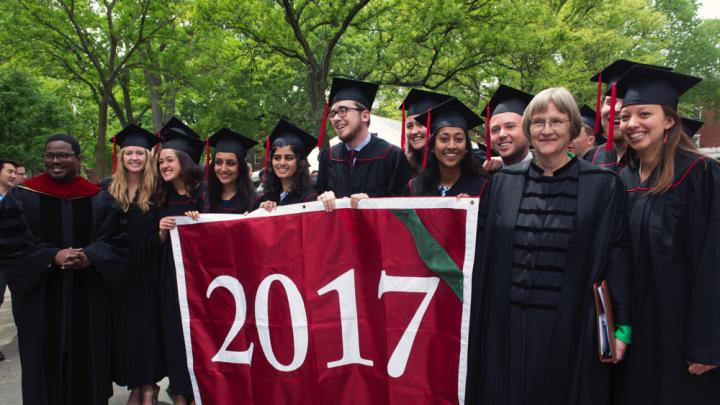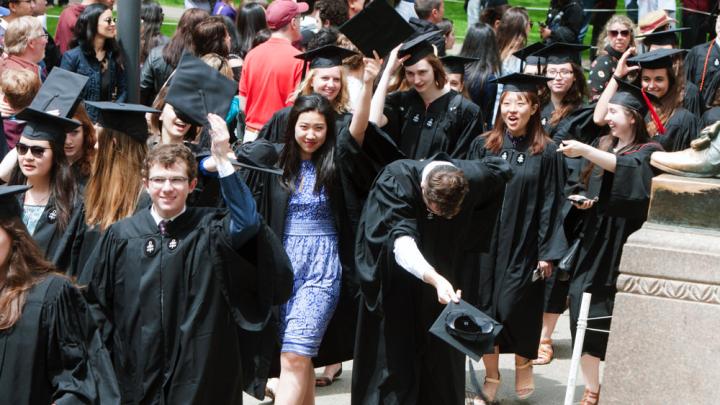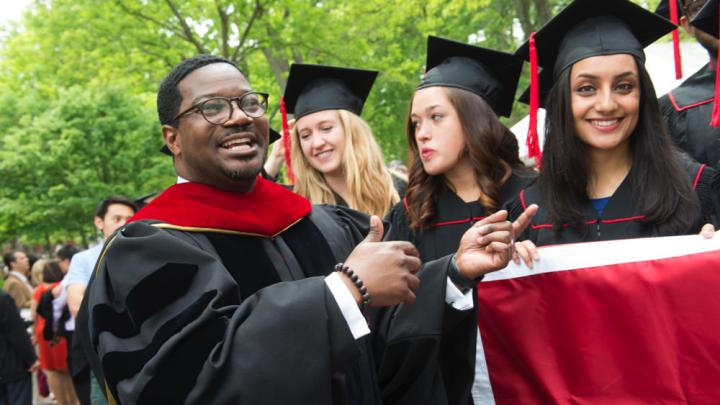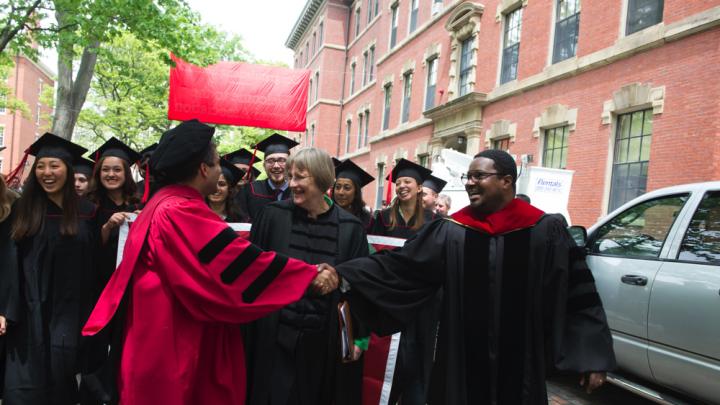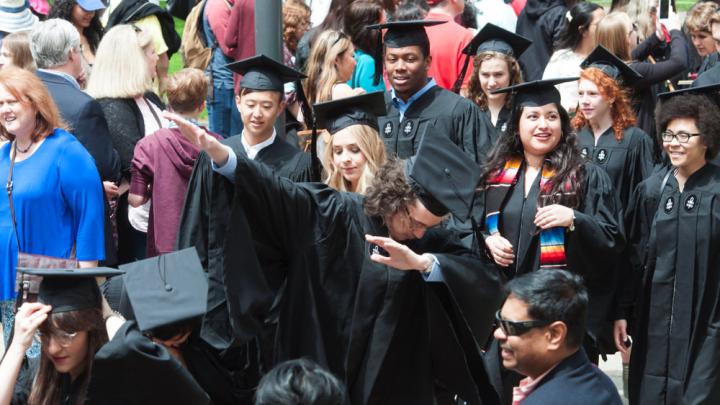“You have stood up and stood out,” President Drew Faust told the graduating seniors of 2017 in the opening frame of her May 23 Baccalaureate address. “The value of being noticed, especially on social media, has been a powerful force in your lives.”
Speaking in the renovated, and now air-conditioned, Memorial Church (“Harvard’s first air-conditioned Baccalaureate in its 381 years”), Faust was setting her audience up for a swerve. But first, she spent a moment naming some of the milestones and major events that, during the past four years, had occupied Harvard students’ Facebook, Snapchat, and Instagram posts: the 2013 Boston Marathon bombing that scuttled their Visitas weekend, 2014’s record-breaking winter that buried the campus under nine feet of snow and had students sledding down the steps of Widener. A mumps outbreak that, as Faust deadpanned, to laughter and applause, “revived old traditions,” and a Harvard workers’ strike—the first in 30 years—that led to “22 days of Insomnia Cookies and Lam Caf coffee as some of you embraced the workers’ cause, taking food to them.”
She made playful reference (cheered on by the graduates) to the “inter-House dining societies” that a Harvard committee report had suggested this past March—to much mirth from the Crimson—might take the place of newly sanctioned final clubs. “Societies might set special themes for some of their meals,” the report said, “purchase special desserts, invite special guests, eat in elegant attire, read Chaucer out loud.”
In their years on campus, Faust continued, graduating seniors had started a Saturday Night Live-style comedy show called SKETCH and an LGBTQ organization for people of color. “You walked out of class to affirm that Black Lives Matter; you rallied against sexual assault; you blockaded Mass Hall in support of fossil fuel divestment; you gathered to protest the implications of the SGSO policy” (which had recommended sanctions against members of final clubs and other single-sex social groups) “for women’s organizations. You marched for science on Boston Common, and you went to jail for immigrant rights.”
Class members wrote honors theses on the history of malt liquor, and cataloguing distant star clusters. Yet another classmate composed one as a rap album based on Chaucer—that one made national news.
These things and more had earned this class of seniors, both individually and collectively, the experience of being noticed. But today, Faust said, she wanted to talk to them “not about being noticed—something you are already very good at—but about the value of noticing.”
The practiced skill of not merely seeing but actively looking, she said, is at the heart of a liberal education. It connects “your mind and awareness to something beyond yourself and often beyond your existing knowledge and assumptions. Noticing is the pathway out of the echo chamber of your own mind.”
Calling out a few examples of how this practice is woven into the curriculum, Faust highlighted the course “The Art of Looking,” in which Agassiz professor of humanities Jennifer Roberts asks students to stand in front of one painting for three hours and note their evolving observations. And Agassiz professor of zoology Hopi Hoekstra, who sends students out for three hours of watching squirrels. And Max Bazerman, who teaches in Harvard Business School and the Kennedy School, whose book concerns noticing and leadership and who teaches a wintersession course called “Noticing—A Leadership Challenge,” designed to help students avoid “noticing failures.” Those failures limit “the range of what we think and do,” Faust said, quoting psychiatrist R.D. Laing. “My graduation wish for you is that we will have succeeded in making you noticers.”
The discipline of looking, she continued, requires self-awareness and the ability to see one’s own prejudices and implicit biases. And it is also an important act of recognition. “To notice is to affirm to another, ‘I see you, you are not invisible.’ It opens the possibility for connection and understanding. Noticing is the condition for empathy.”
The president reminded graduates to notice their own luck. People remember the headwinds that blow against them, she said, paraphrasing Harvard’s Sendhil Mullainathan, Waggoner professor of economics, and tend to forget the tailwinds. Acknowledging that many of the seniors in the audience had worked hard in the face of long odds to earn their degrees, Faust cautioned, “And yet: there are 7 billion people in the world. There are 1,626 of you.…How often do we remind ourselves that to some degree we won a global lottery over which we had no control?” There exists an important reason for that reminder: “By noticing our own luck,” she added, “we can more easily notice when other don’t have it.”
Finally, she said, noticing “means being open to unexpected and sometimes challenging points of view,” and to reversing one’s position in light of a powerful new observation: “It is about the critical attention necessary to the pursuit of truth. It is about resisting the dangerous post-factual world in which we seem to find ourselves.”
Calling the work of noticing not a “job,” but a “way of being, a habit of moving through the world,” Faust recalled a talk last year in Sanders Theatre by comedian Conan O’Brien ’84, in which he said that comedy is “a shard of the truth, a spark…that is there for a second and then disappears.” Noticing is like that, too—a pursuit of truth, Faust said. “Read your Chaucer out loud. Watch the squirrels. Keep looking and listening.”
Jonathan L. Walton, Plummer professor of Christian morals and Pusey minister in the Memorial Church, conducts the Baccalaureate service. “This week is not one of culmination and conclusion concerning your education,” he told graduates. “It’s a commencement—it’s just the beginning.”
The ceremony has been a Harvard tradition since the seventeenth century, but now includes readings from Confucianism, Judaism, Christianity, and Hinduism, as well as the traditional singing of Psalm 78 to the tune “St. Martin’s,” an observance since at least 1806. This year the occasion also included a Diné (Navajo) prayer and a reading from the work of late Irish poet and Boyleston professor of rhetoric and oratory emeritus Seamus Heaney.
